Tata Group
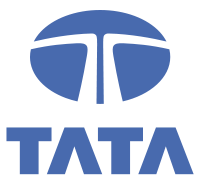 | |
| Public | |
| Industry | Conglomerate |
| Founded | 1868 |
| Founder | Jamshetji Tata |
| Headquarters | Bombay House, Mumbai, Maharashtra, India |
Area served | Worldwide |
Key people |
|
| Products | |
| Revenue |
|
| Total assets |
|
| Owner | Tata Sons |
Number of employees | 695,699 (2017)[3] |
| Subsidiaries | List of subsidiaries |
| Website |
www |
Tata Group (/ˈtɑːtɑː/) is an Indian multinational conglomerate holding company headquartered in Mumbai, Maharashtra. Founded in 1868 by Jamshedji Tata, the company gained international recognition after purchasing several global companies, beginning with Tetley in 2000, recorded as "the biggest acquisition in Indian corporate history."[4] One of India's largest conglomerates, Tata Group is owned by Tata Sons, a registered charity.[5][6]
Each Tata company operates independently under the guidance and supervision of its own board of directors and shareholders. There are 29 publicly listed Tata enterprises with a combined market capitalisation of about $151.62 billion as of March 1, 2018.[3] Significant Tata companies and subsidiaries include Tata Steel, Tata Motors, Jaguar Land Rover with its marques Jaguar and Land Rover, Tata Consultancy Services, Tata Power, Tata Chemicals (including Tata Swach), Tata Global Beverages (including Tata Coffee), Tata Teleservices, Titan, Tata Communications, and The Indian Hotels Company Limited (Taj Hotels).
Chairman
The Chairman of Tata Sons is usually the Chairman of the Tata Group.
- Jamsetji Nusserwanji Tata (1868–1904)
- Sir Dorab Tata (1904–1932)
- Nowroji Saklatwala (1932–1938)
- JRD Tata (1938–1991)
- Ratan Tata (1991–2012)
- Cyrus Pallonji Mistry (2012–2016)
- Ratan Tata (2016–2017)
- Natarajan Chandrasekaran (2017–present)[7]
Subsidiaries


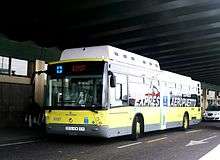
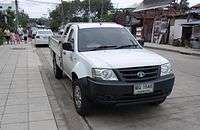
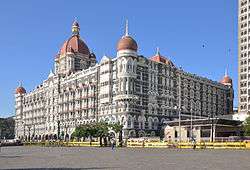
This section lists the Tata companies and details their business:
Chemicals
- Tata Chemicals
- Advinus Therapeutics
- Brunner Mond
- General Chemical Industrial Products
- Magadi Soda Company
- Rallis India
- Tata Pigments Limited
Consumer products
- Casa Décor
- Eight O'Clock Coffee
- Fastrack, youth fashion brand
- Himalayan, mineral water brand
- I-shakti
- Infiniti Retail (Cromā)
- Landmark Bookstores
- Tanishq
- Tata Ceramics
- Tata Coffee
- Tata Global Beverages, the world's second largest manufacturer of packaged tea and tea products
- Tata Industries
- Tata International Ltd.
- Tata Refractories
- Tata Salt
- Tata Sky
- Tata Starbucks, a 50:50 joint venture company, owned by Starbucks Corporation and Tata Global Beverages
- Tata Swach
- Tata Zoya
- Tetley
- Titan Eye+, optical stores from Titan Industries
- Titan Industries
- Voltas, consumer electronics company
- Westside
Energy
- Hooghly Met Coke and Power Company
- Jamshedpur Utilities and Services Company
- Powerlinks Transmission
- Tata Petrodyne
- Tata Power, one of the largest private sector power companies
- Tata Power Delhi Distribution Ltd (formerly known as North Delhi Power Ltd)
- Tata Power Solar, started as a joint venture between Tata Power and BP Solar, now a wholly owned company
- Tata Power Trading
- Tata Projects
Engineering
- Hispano Carrocera
- TAL Manufacturing Solutions
- TASL (Tata Advanced Systems Limited)
- Tata Advanced Materials
- Tata Advanced Systems
- Tata AutoComp Systems Limited (TACO)
- Tata Consulting Engineers Limited
- Tata Marcopolo
- Tata Cummins
- Tata Motors, manufacturer of commercial vehicles (largest in India) and passenger cars
- Jaguar Land Rover (manufacturing cars under the Jaguar and Land Rover marques)
- Tata Daewoo Commercial Vehicle
- Tata Motors European Technical Centre
- Tata Petrodyne
- Tata Precision Industries
- Tata Projects
- Tata Technologies Limited
- Telco Construction Equipment
- Telcon Construction Equipment
- TRF
- Voltas Global Engineering Centre
- TitanX
Information systems and communications
- CMC Limited
- Computational Research Laboratories
- INCAT
- Nelco
- Nelito Systems
- Tata Business Support Services
- Tata Communications
- Tata Consultancy Services Ltd. (TCS), one of the world's largest IT services companies
- Tata DoCoMo
- Tata Elxsi
- Tata Interactive Systems
- Tata Teleservices
- Tatanet, managed connectivity and VSAT service provider
- VSNL International Canada
Services
- Indicash ATM
- Air Asia India, TATA joint venture with Air Asia
- Drive India Enterprise Solutions
- e-Nxt Financials Ltd.
- The Gateway Hotels & Resorts
- Ginger Hotels
- The Indian Hotels Company
- Mjunction
- Roots Corporation
- Taj Hotels
- TajAir
- Tata Advanced Systems Limited
- Tata Africa Holdings
- Tata AG
- TATA AIA Life Insurance
- TATA AIG General Insurance
- Tata Asset Management
- Tata AutoComp Systems
- Tata Capital
- Tata Financial Services
- Tata Housing Development Company Ltd. (THDC)
- Tata Industrial Services
- Tata Interactive Systems
- Tata International AG
- Tata Investment Corporation
- Tata Limited
- Tata NYK
- Tata Quality Management Services
- Tata Realty and Infrastructure Limited
- Tata Services
- Tata Strategic Management Group
- TKM Global, Logistics and Supply Chain
- Vistara
- Vivanta By Taj
Steel
- JAMIPOL
- NatSteel Holdings
- Tata Bearings
- Tata BlueScope Steel
- Tata Metaliks
- Tayo Rolls
- Tata Sponge Iron
- Tata Steel
- Tata Steel Europe
- Tata Steel KZN
- Tata Steel Processing and Distribution
- The Tinplate Company of India
- TM International Logistics
[Acquisitions]:
- February 2000 – Tetley Tea Company, $407 million[8]
- March 2004 – Daewoo Commercial Vehicle Company, $102 million
- August 2004 – NatSteel's Steel business, $292 million
- November 2004 – Tyco Global Network, $130 million
- July 2005 – Teleglobe International Holdings, $239 million
- October 2005 – Good Earth Corporation
- December 2005 – Millennium Steel, Thailand, $165 million
- December 2005 – Brunner Mond Chemicals, $10 million
- June 2006 – Eight O'Clock Coffee, $220 million
- November 2006 – Ritz Carlton Boston, $170 million
- January 2007 – Corus Group, $12 billion[9]
- March 2007 – PT Kaltim Prima Coal (KPC) (Bumi Resources), $1.1 billion
- April 2007 – Campton Place Hotel, San Francisco, $60 million
- January 2008 – Imacid Chemical Company, Morocco[10]
- February 2008 – General Chemical Industrial Products, $1 billion
- March 2008 – Jaguar Cars and Land Rover, $2.3 billion
- March 2008 – Serviplem SA, Spain
- April 2008 – Comoplesa Lebrero SA, Spain
- May 2008 – Piaggio Aero Industries S.p.A., Italy - Sold Off in 2015
- June 2008 – China Enterprise Communications, China
- October 2008 – Miljo Grenland / Innovasjon, Norway
- April 2010 - Hewitt Robins International, United Kingdom
- July 2013 - Alti SA, France
- December 2014 - Energy Products Limited, India
- June 2016 - Welspun Renewables Energy, India
- May 2018 - Bhushan Power and Steel, India
Philanthropy
Tata Group has helped establish and finance numerous research, educational and cultural institutes in India,[11][12] and received the Carnegie Medal of Philanthropy.[13] Some of the institutes established by the Tata Group are:
- The Energy and Resources Institute (formerly known as Tata Energy and Research Institute), a non-governmental research institute
- The JRD Tata Ecotechnology Centre
- National Centre for Performing Arts
- Tata Center for Technology & Design at Massachusetts Institute of Technology[14]
- Tata Centre for Technology & Design at IIT Bombay[15]
- Tata Cricket Academy
- Tata Football Academy
- Tata Institute of Social Sciences
- Tata Management Training Centre
- Tata Medical Center, inaugurated on 16 May 2011 by Ratan Tata[16]
- Tata Memorial Hospital
- Tata Cancer Hospital
- Tata Trusts, a group of philanthropic organisations run by the head of the business conglomerate Tata Sons
In 2008, Tata Group donated $50 million USD to Cornell University for "agricultural and nutrition programs in India and for the education of Indian students at Cornell."[17]
In 2010, Tata Group donated ₹ 2.20 billion ($50 million) to the Harvard Business School (HBS) to build an academic and a residential building for executive education programmes on the institute's campus in Boston, Massachusetts, now Tata Hall,[18] which is the largest endowment received by HBS from an international donor.
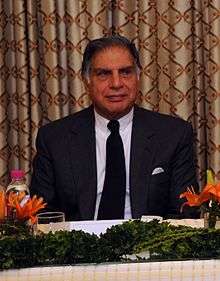
In 2017, Tata Football Academy won the bid to form the Jamshedpur FC, a football club based on Jamshedpur of Jharkhand in the 4th edition of the Indian Super League.
Controversies and criticisms
The Tata Group has also attracted some controversy during its more than 150 years in operation, notably:
Munnar, Kerala
The Kerala Government filed an affidavit in the high court alleging that Tata Tea had "grabbed" forest land of 3,000 acres (12 km2) at Munnar. The Tatas provided that they possessed 58,741.82 acres (237.7197 km2) of land, which they are allowed to retain under the Kannan Devan Hill (Resumption of Lands) Act, 1971, and there was a shortage of 278.23 hectares in that. The Chief Minister of Kerala V.S. Achuthanandan, who vowed to evict all on government land in Munnar, formed a special squad for the Munnar land takeover mission and started acquiring back properties. However, the mission was aborted due to both influential land-holders and opposition from Achuthanandan's own party.
Kalinganagar, Odisha
On 2 January 2006, Kalinganagar, Odisha villagers protested the construction of a compound wall on land historically owned by them, for a Tata steel plant. Police opened fire at a crowd after a policeman was gruesomely killed by the mob.[20]
Supplies to Burma's military regime
Tata Motors reported that deals to supply hardware and automobiles to Burma's military junta had come in for criticism from human rights and democracy activists. In December 2006, Gen. Thura Shwe Mann, Myanmar's chief of general staff visited the Tata Motors plant in Pune.[21] In 2009, TATA Motors announced that it would press ahead with plans to manufacture trucks in Myanmar.[22][23]
Singur land acquisition
The Singur controversy[24] in West Bengal was a series of protests by locals and political parties over the forced acquisition, eviction, and inadequate compensation to those farmers displaced for the Tata Nano plant, during which Mamata Banerjee's party was widely criticised as acting for political gain. Despite the support of the Communist Party of India (Marxist) state government, Tata eventually pulled the project out of West Bengal, citing safety concerns. Narendra Modi, then Chief Minister of Gujarat, made land available for the Nano project.[25]
On Aug 31, 2016, in a historic judgement, the Honorable Supreme Court of India set aside the land acquisition by the West Bengal Government in 2006 that had facilitated Tata Motors' Nano plant, stating that the West Bengal government had not taken possession of the land legally, and were now required to repossess and return it to local farmers within 12 weeks.[26]
Dhamra Port, Odisha
On the environmental front, the Port of Dhamara controversy has received significant coverage, both within India and in Tata's emerging global markets.[27][28] The Dhamra port, a venture between Tata Steel and Larsen & Toubro, has been criticised by Indian and international organisations due to its proximity to the Gahirmatha Sanctuary and Bhitarkanika National Park. Gahirmatha Beach is one of the world's largest mass nesting sites for the Olive Ridley Turtle, and India's second largest mangrove forest, Bhitarkanika, is a designated Ramsar site. TATA officials state that the port poses an ecological threat, and that mitigation measures are being employed with the advice of the IUCN,[29] while conservation organisations, including Greenpeace, assert that no proper environmental impact analysis has been done for the project, which has undergone changes in size and specifications since it was first proposed; critics claimed that the port could disrupt mass nesting at Gahirmtha beaches as well as the ecology of the Bitharkanika mangrove forest.[30][31]
Soda extraction plant in Tanzania
Tata group, along with a Tanzanian company, joined forces to build a soda ash extraction plant in Tanzania.[32] Environmental activists oppose the plant because it would be near Lake Natron, and it has a very high chance of affecting the lake's ecosystem and its neighbouring dwellers,[33] jeopardising endangered Lesser Flamingo birds. Lake Natron is where two-thirds of Lesser Flamingos reproduce.[34] Producing soda ash involves drawing out salt water from the lake, and then disposing the water back to the lake. This process could interrupt the chemical makeup of the lake.[32] 22 African nations are against the creation of the project and have signed a petition to stop its construction.[32]
Data and intellectual property theft
In April 2016, a U.S. Federal Grand Jury awarded Epic Systems a $940 million judgement against Tata Consultancy Services and Tata America International Corp. Filed 31 October 2014; the suit charged that "6,477 unauthorized downloads could be used to enhance Tata's competing product, Med Mantra."[35][36][37] In 2017, U.S. District Court Judge William Conley reduced the Award to $420 million; the company states that the judgement is also being appealed, as "not supported by evidence presented during the trial and a strong appeal can be made to superior court to fully set aside the jury verdict.”[38]
2018 NCLT verdict
In July 2018, the National Company Law Tribunal (NCLT), which "adjudicates issues relating to Indian companies,"[39] issued a verdict in the company's favor on charges of mismanagement leveled in 2016 by ousted chairman, Cyrus Mistry.[40]
2016 fire at headquarters
On 16 June 2016, an electrical short-circuit sparked a fire broke out at Tata Group corporate headquarters in Mumbai. Owing to quick containment, no casualties were reported.[41]
See also
References
- ↑ "N Chandrasekaran, CEO and MD of Tata Consultancy Services, is new Chairman of Tata ratan Tata Group". Times of India. New Delhi. 12 January 2017. Retrieved 12 January 2017.
- ↑ Pandey, Piyush (2017-05-22). "Saurabh Agrawal is the Tata Sons' Chief Finance Officer". The Hindu. ISSN 0971-751X. Retrieved 2017-09-16.
- 1 2 3 4 "Tata Group Financial Statements". Tata Group.
- ↑ "Tetley bagged by India's Tata on 27 February 2000". BBC. Retrieved 4 June 2018.
- ↑ Pocha, Jehangir (12 December 2011). Tata Sons: Passing the Baton. Forbes India. Retrieved 25 September 2017.
- ↑ "Tata Sons Limited vs The Deputy Cit, Special Range-1 on 28 April, 2006". www.indiankanoon.org. Civil court, Mumbai. Retrieved 25 September 2017.
- ↑ "TCS boss N Chandrasekaran is the new Tata Sons Chairman". 17 December 2017 – via The Economic Times.
- ↑ "Tatas' shopping spree: 27 in 6 years!". Rediff. 24 August 2006. Retrieved 15 August 2015.
- ↑ "Tata Steel gives India a pound of UK". timesofindia-economictimes. Retrieved 15 August 2015.
- ↑ Timmons, Heather (4 January 2008). "Tata Pulls Ford Units into Its Orbit". The New York Times. Retrieved 21 June 2009.
- ↑ "The rainbow effect". 4 May 2008.
- ↑ "India's Tata Group: Empowering marginalized communities". 4 May 2008.
- ↑ "U.S. and Indian philanthropists recognized for conviction, courage and sustained efforts". 4 May 2008. Archived from the original on 26 September 2008.
- ↑ "MIT Tata Center: MIT Tata Center". tatacenter.mit.edu.
- ↑ "Tata Centre for Technology & Design at IIT Bombay".
- ↑ "Tata Medical Center". Retrieved 15 August 2015.
- ↑ "$50 million endowment from Tata trust bolsters Cornell ties to India, and to eminent alumnus". Cornell. USA. 17 October 2008. Retrieved 11 June 2018.
- ↑ "Tatas gift Rs220 crore to Harvard Business School – Mumbai – DNA". Dnaindia.com. 16 October 2010. Retrieved 2 February 2011.
- ↑ "Cyrus Mistry Replaced by Ratan Tata as Tata Sons chairman - The Economic Times". The Economic Times. Retrieved 2016-10-27.
- ↑ Nityanand Jayaraman (24 May 2006). "CorpWatch : Stolen for Steel: Tata Takes Tribal Lands in India". Corpwatch.org. Retrieved 16 July 2010.
- ↑ ["Myanmar Ties." 8 December 2006. The Telegraph, Calcutta, India].
- ↑ "India's Independent Weekly News Magazine". Tehelka. Retrieved 16 July 2010.
- ↑ "Ansari visits Myanmar tomorrow, 3 MoUs to be signed". Zeenews.com. 4 February 2009. Retrieved 16 July 2010.
- ↑ "Singur farmers: Why they oppose Tata plant". Retrieved 15 August 2015.
- ↑ "Singur's loss". Hinduonnet.com. 7 November 2008. Retrieved 2 February 2011.
- ↑ "Singur verdict announced, SC says return land to farmers: Here's a timeline of the case - Firstpost". Firstpost. 2016-08-31. Retrieved 2016-10-25.
- ↑ 'India – Tata in troubled waters', Ethical Corporation, November 2007, London, UK
- ↑ "India – Tata in troubled waters – Ethical Corporation". Ethicalcorp.com. Retrieved 16 July 2010.
- ↑ "Page Not Found". Retrieved 15 August 2015.
- ↑ "Documents And Reports | Save the turtles". Greenpeace.in. 12 June 2009. Retrieved 16 July 2010.
- ↑ "Sea dredging affecting Olive Ridley turtles, says green body". Thaindian.com. 5 April 2008. Retrieved 16 July 2010.
- 1 2 3 "Dar annoys neighbours over $400m soda ash project". The East African. Nation Media Group. 5 November 2007. Retrieved 21 June 2009.
- ↑ Magubira, Patty (16 May 2008). "Tanzania: UK Activists Pile Pressure Against Soda Ash Project". The Citizen. Dar es Salaam: AllAfrica.com. Retrieved 21 June 2009.
- ↑ Pathak, Maulik (31 October 2007). "Tata Chemicals' African safari hits green hurdle". The Economic Times. India. Retrieved 21 June 2009.
- ↑ "US jury slaps $940 million fine on Tata group in trade secret case". The Times of India. 16 April 2016. Archived from the original on 16 April 2016. Retrieved 16 April 2016.
- ↑ Judy Newman (5 April 2016). "Jury trial begins in Epic Systems Corp. lawsuit against India's Tata Consultancy". Wisconsin State Journal. Archived from the original on 16 April 2016. Retrieved 16 April 2016.
According to the 40-page complaint, Tata employees fraudulently accessed Epic documents and downloaded at least 6,477 of them, containing information that could be used to benefit Tata’s own health care software, Med Mantra.
- ↑ Kyle Murphy, PhD (11 April 2016). "Epic Systems Taking TCS to Court over Theft of Trade Secrets". EHR Intelligence. Archived from the original on 16 April 2016. Retrieved 16 April 2016.
[T]he documents downloaded by TCS personnel included, among other things, documents detailing over twenty years of development of Epic’s proprietary software and database systems, including programming rules and processes developed to produce optimal functionality of Epic’s software; documents that decode the operation of its source code that would otherwise be unusable to those outside of Epic; and information regarding Epic’s system capabilities and functions, including procedures for transferring data between customer environments, rules related to information collection, methods for limiting access to patient records, and processes for converting customer data, all of which reveal decades of work with its customers to determine the functionality desirable or required for Epic to provide successful products to those customers.
- ↑ Wahlberg, David "Award to Epic in trade secrets case reduced from $940 million to $420 million", Wisconsin State Journal, October 4, 2017. Retrieved July 12, 2018.
- ↑ "National Company Law Tribunal constituted - new perspectives for dispute resolution". Khaitan & Co. Retrieved 13 June 2016.
- ↑ "Ratan Tata welcomes NCLT verdict". The Economic Times. 9 July 2018. Retrieved 12 June 2018.
- ↑ "Fire at TATA Group headquarters". The Economic Times. Times Group.
External links
- Official website
- Tata Group collected news and commentary at BloombergQuint